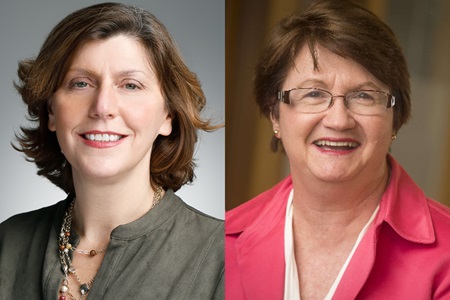
Two prominent figures in the field of stroke research—Lauren Sansing (Yale School of Medicine, New Haven, USA) and Virginia Howard (University of Alabama at Birmingham [UAB], Birmingham, USA)—are set to be recognised with awards at the upcoming American Heart Association (AHA) Scientific Sessions (16–18 November, Chicago, USA).
During the AHA 2024 Presidential Session on Sunday 17 November, Sansing will receive the association’s Basic Research Prize, while Howard will be awarded its Population Research Prize.
Sansing is a professor of neurology and immunobiology at Yale School of Medicine, as well as the vice chair of academic and faculty affairs in the Department of Neurology. Her research focuses on maximising potential recovery for people who experience complex neurovascular diseases, such as stroke and intracerebral haemorrhage (ICH).
Sansing leads an AHA- and National Institutes of Health (NIH)-funded laboratory that includes 14 researchers, students and other trainees at Yale School of Medicine. The ‘Sansing Lab’ studies immune system responses after ischaemic stroke, ICH and vascular dementia. She and her research team are working to learn which immune responses help brains to heal after injury, and which responses make healing more difficult, with the goal of taking this knowledge and applying it to patient care to enhance the immune responses that aid in healing and suppress immune responses that hinder healing in order to provide the best possible recovery for people who experience brain injuries. Sansing and her team are also committed to enhancing translation to patient care through rigorous testing of candidate treatments for stroke via the National Institute of Neurological Disorders and Stroke (NINDS)-funded Stroke Preclinical Assessment Network.
“Dr Sansing’s research is at the forefront of unlocking opportunities for people who have strokes to recover their ability to function,” said AHA 2024–2025 volunteer president Keith Churchwell (Yale School of Medicine, New Haven, USA). “Congratulations, Lauren, on this well-deserved award. Discoveries from your research will help us fine-tune our approaches and likely change the landscape of stroke treatment in the near future.”
“I’m honoured to have my research recognised and celebrated by the AHA,” Sansing commented. “It’s my mission to uncover new treatments to improve outcomes after stroke and maximise recovery potential for people who have cerebrovascular disease.”
Howard is a distinguished professor of epidemiology at the UAB School of Public Health. She is also a senior scientist for 12 centres within the UAB’s School of Medicine, School of Public Health and School of Health Professions. Howard’s research centres on stroke and the many factors contributing to the unequal burden of the disease. Her research interests are primarily in long-term studies examining health disparities, cognitive functioning and stroke risk factors, including sex differences.
Howard is the lead stroke epidemiologist for the REGARDS study—a nearly 25-year cohort study examining why there are higher rates of death from strokes among Black adults compared to white adults in the USA, and higher rates across the southeastern USA—sometimes referred to as the ‘Stroke Belt’—compared to the rest of the country. REGARDS is funded by the NINDS and the National Institute on Aging, which are both divisions of the NIH. In 2013, Howard published findings from REGARDS showing that, after adjusting for stroke risk factors, just living in the Stroke Belt during one’s teenage years was associated with a higher risk of stroke. Across all age groups, living in the Stroke Belt increased risks roughly two-fold for Black compared to white patients. In 2020, Howard presented findings from REGARDS that suggest living in the Stroke Belt as a child or young adult may be associated with higher risks of cognitive impairment later in life, regardless of where one lives later in life.
“Dr Howard’s career has significantly contributed to what we know about stroke,” Churchwell noted. “Throughout her 30-plus years in epidemiology and clinical trials, we have learned more about stroke disparities in different racial groups, how stroke differs in women compared to men, and how early life exposures can affect a person’s risk for stroke and cognitive impairment. Thanks to her years of focus and dedication, we have been able to make significant strides to improve stroke prevention and treatment.”
“It’s a great honour to be recognised by the [AHA] for my part in research exploring health risks of different populations,” said Howard. “I’m a firm believer that when we know more, we do more. In terms of stroke prevention, that translates to: the more we know about how early life factors, sex, race and geographic location influence the risk of having a stroke, the earlier we can implement interventions at the community and individual level to reduce stroke risk—even to prevent some of the risk factors from developing in the first place.”









